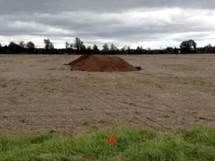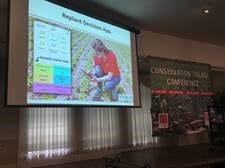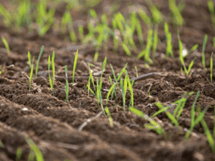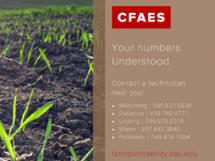Good afternoon,
I just returned from an OSU Ag Crops Team meeting in Columbus today. Driving back to Hardin County, I noticed that the fields looked to be starting the drying out process. Still I have not seen any field activity except for some tile drainage work. The days are getting warmer and hopefully soon, fieldwork will be a common sight around the county. There have been alot of meetings this winter, and tomorrow we will have our final one with the Fertilizer and Pesticide Make-up & Specialty Training. If you have a fertilizer or pesticide license that is expiring soon, you may want stop by the Extension office tomorrow (3/29) morning to get your recertification taken care of. We will be starting with fertilizer at 11:00 am and then move on with pesticide at 12:00 pm. The training cost payable to OSU Extension is $10 for fertilizer and $30 for pesticide recertification if you still need the recertification training. If you already have your recertification completed, make sure you return the license renewal form and $30 license renewal fee payable to the Ohio Department of Agriculture in Reynoldsburg.
Spring burndowns may start soon so make sure you are up on the dicamba rules. In late October 2018, the EPA approved revised labels for Xtendimax, FeXapan, and Engenia. All three products are restricted use pesticides, meaning an applicators license must be held in order to purchase and apply these products. It is no longer acceptable to simply operate under the supervision of someone with a license for these chemicals. The dicamba specific training is still required so if you need it yet for this year, go to https://pested.osu.edu/ as there are two online training links provided by BASF and Monsanto. If you were able to get cover crops planted this past fall, you might want to read the news release that I have attached about terminating cover crops. This article was written by Auglaize County Extension Educator and weed scientist Jeff Stachler.
Cover Crop Termination News Release
Have you ordered from the Hardin County Dairy Service Unit Cheese Sale yet this spring? Orders are coming due on April 1 so if you are interested, I have attached a copy of the news release and order form. Funds from the semi-annual cheese sale are used to support dairy youth activities such as scholarships, royalty, awards, and other activities planned by the Dairy Service Unit. Events coming up in the area include a Farm Bill Summit being held April 11 at Versailles High School in Darke County. See the attached flyer for more information. This Saturday (3/30) is the Hardin County Goat Banquet being held at the Kenton Christian & Missionary Alliance Church starting at 5:30 pm. There is a Farm Bureau meeting April 2 at Layman Farms starting at 7:00 pm; Fairboard meeting April 3 at the fair office starting at 7:00 pm, and Ag Council breakfast April 5 at McDonalds starting at 7:30 am. Come join our group for information about the Lake Erie Bill of Rights and a roundtable discussion about county agriculture. Be safe and enjoy the articles below.
Spring Cheese Sale News Release
Mark
Soybean Cyst Nematode Samples – Spring is still a good time! – Anne Dorrance
Lots of news about Soybean cyst nematode at Commodity Classic a couple of weeks ago. We have continued support to run assays and education sessions for farmers throughout the region to be able to answer “What’s your number?” There are fields throughout the Midwest, where not only are SCN numbers creeping up to economic levels but also the reproduction factor, which is the ability to reproduce on the one source of resistance (PI 88788) is also creeping up. The good news is that adaptation to the PI 88788 type of resistance towards SCN in soybean is going to be slow – but it is happening in a couple of fields in Ohio where the number of cysts are up to 27% of the susceptible check. Read more at https://agcrops.osu.edu/newsletter/corn-newsletter/2019-06/soybean-cyst-nematode-samples-%E2%80%93-spring-still-good-time.
Fertilizer License and Poultry Litter – Glen Arnold
There have been a few phone calls from farmers calling about needing to get their fertilizer license in order to receive or spread poultry litter. This has been the law in Ohio for several years since Senate Bill 1 was passed. Any farmer handling, receiving, or applying poultry litter (or any other manure) from a permitted farm in Ohio must have either a fertilizer license or a Certified Livestock Manager certificate or be a Certified Crop Advisor. Most poultry farms in Ohio are permitted so nearly all the poultry litter available to farmers is from permitted farms. If you need new fertilizer license certification there are still a few opportunities in March and April. Here is a website you can access for dates and locations. https://nutrienteducation.osu.edu/trainingopportunities
Late season rains impacted seed quality – Anne Dorrance (Co-author: Felipe F. Sartori, Ohio State Department of Plant Pathology)
Lots of calls and samples concerning seed quality (Figure 1) and I’ve also heard about the rejections at the elevators. I was in Florida a couple of weeks ago with my colleagues (soybean pathologists) from across the country and Ontario, Canada and we are not alone. We were not the only state whose soybeans had plentiful rains through and after grain fill with some still in the field! What is causing all of the low germination? From the samples we have received, we are culturing the expected seed borne pathogens: Phomopsis, Diaporthe, Fusarium, and Cercospora spp. (Figure 2, 3) All of these will affect seed and seedling health if the seed is not treated with a fungicide that can control true fungi. Go to https://agcrops.osu.edu/newsletter/corn-newsletter/2019-06/late-season-rains-impacted-seed-quality to finish reading about soybean seed quality.
Reducing the Risk of Back Injuries – Kent McGuire
Back pain can be a common issue in the agricultural industry because of the physical nature of work and the vast array of tasks associated with agriculture. Many workers are required to do heavy lifting, a tremendous amount of walking and work in awkward positions to complete tasks. There are a number of factors that can contribute to back pain including force, posture, repetition, and even inactivity. Back injuries can be chronic or short term, but at some point everyone will experiences some form of back injury. Once a back injury has occurred, special consideration needs to be given to the spine, muscles and tendons to prevent a back injury from occurring again. There are several measures that can be taken to reduce the risk of a back injury and many tasks can be modified to relieve stress placed on the back. Read more at https://agsafety.osu.edu/newsletter/ag-safety-stat/january-2019/injury-prevention/reducing-risk-back-injuries.
Dragline application of manure to growing soybeans – Jason Hartschuh, Glen Arnold
As we continue to search for profitable ways to expand the manure application window in Ohio, we have begun to research dragline application of manure to growing soybeans. While this would potentially open up more time for manure application in the spring, our initial research goal is to look at the ability to apply manure to emerged double crop soybeans after wheat. For many years, livestock producers have successfully applied liquid manure to newly planted soybeans in July to help provide moisture for germination and emergence. In 2018 we conducted trials at Western and Northwest OARDC to determine the yield effects a loaded 5 inch drag hose would have on growing soybeans. Find out more about this research at https://agcrops.osu.edu/newsletter/corn-newsletter/2019-06/dragline-application-manure-growing-soybeans.
Mark A. Badertscher
Agriculture and Natural Resources Educator
OSU Extension Hardin County
1021 W. Lima Street, Suite 103, Kenton, OH 43326
419-674-2297 Office
hardin.osu.edu















